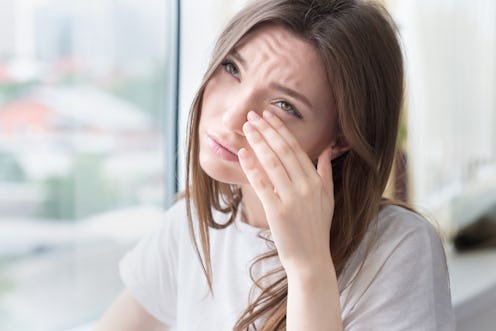
You probably know what the signs you're developing calluses on your hands or feet are. For instance, the rough skin is a dead giveaway. But hands and feet aren't the only places you can get calluses. Eye calluses are also a thing — and there are some telltale signs you have an eye callus that everyone with eyes should know. I'm talking things like blurred vision, redness, and eye pain.
Eye calluses and ulcers can develop as a result of extended wear contact lenses, air pollution, too much direct sunlight, smoking, or bad hygiene, i.e. not washing your hands and then touching your eyeball. Eye health is not something most people spend a lot of time thinking about until a problem develops, and even then it seems pretty low priority. I mean, who hasn't had a little eye irritation from time to time? I live in Los Angeles, and every year when the Santa Ana winds blow, the dust and debris swirling through the air makes me rub my eyes so much that they almost swell shut. Despite this, I never once considered that this could lead to something as horrifying as an eye callus. Same? Here are signs you have an eye callus but don't know it.
1
You See A Growth On Your Eye
If you see a growth on your eye, this is a pretty big clue. Pinguecula and pterygium, also sometimes called surfer's eye, are non-cancerous calluses on the eye, according to the American Academy of Ophthalmology. Pinguecula growths are generally yellow spots or bumps that appear on the whites of your eyes in the form of fat, calcium, and protein deposits. In some cases, these growths can become pterygium, fleshy ulcers that grow on your cornea and can affect your vision. If you notice anything like this on your eye, even if you don't have any other symptoms, see an eye doctor ASAP.
2
It Feels Like Something Is In Your Eye
There few eye issues more uncomfortable than the feeling of having something in your eye. You check your eye in bright light with a pocket mirror, and perhaps you ask friends to look at your eye too. But you can't find anything in your eye that's causing the discomfort. Ugh. If this happens to you, and the feeling persists for more than a few days, Healthline reported that you may have a pinguecula, an eye callus.
3
Persistent Dry Eye
If you're not someone who generally suffers from dry eye, and you're suddenly stricken with persistent dry eye, Healthline reported that this is a symptom of a pinguecula. If you also feel like you have something stuck in your eye in addition to the dryness, it's pretty likely that an eye callus is to blame.
4
Red Eyes
If one or both of your eyes is red or inflamed, and you don't have allergies, it doesn't mean you've been bitten by a vampire and are relegated to becoming one of the undead. If you can't find any reasonable explanation for your red and inflamed eyes, the website All About Vision noted that this is indeed a sign of the dreaded eye callus.
5
Burning Sensations In Your Eyes
All About Eyes also classified burning sensations as a symptom of a pinguecula. I suspect persistent burning sensations in your eyes must be pretty painful, or hella uncomfortable at the very least. If your eyes start burning for no reason (like you didn't get soap in them), it's time to — you guessed it — see an eye doctor.
6
You Have An Eye Callus, Now What?
In general, eye issues are nothing to mess around with. Eyes are not like hair, skin, nails, or bones. If you break your eyes, you can't grow new ones, and artificial ones hardly work the same as the originals. Treatment for eye calluses include drops and anti-inflammatory medications to relieve the symptoms. If the pinguecula is super uncomfortable, grows too large, or becomes a pterygium, your doctor may suggest having it removed. No matter what, make sure you protect your eyes when you're out in the sun by wearing your sunnies. Because when it comes to your eyes, if something doesn't feel right, it's always better to be safe than sorry. #TheMoreYouKnow